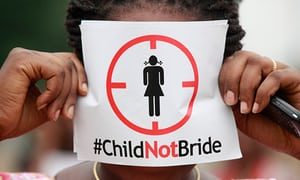African countries lose $63b due to child marriage – World Bank
 In Ghana, the laws permit a 16-year-old girl to have consensual sex, but she can’t marry until she is 18 years. There is however, the incidence of child marriage in the country, which has been decreasing after spirited campaigns by CSOs and other activists, but a report by the World Bank is showing that like all other sub-Saharan African countries where child marriage happen, the incidence is having a an economic consequence on Ghanaian societies.
In Ghana, the laws permit a 16-year-old girl to have consensual sex, but she can’t marry until she is 18 years. There is however, the incidence of child marriage in the country, which has been decreasing after spirited campaigns by CSOs and other activists, but a report by the World Bank is showing that like all other sub-Saharan African countries where child marriage happen, the incidence is having a an economic consequence on Ghanaian societies.
The new World Bank report released recently says African countries are losing $63 billion due to child marriages.
The report which was launched ahead of the African Union Commission’s second African Girls Summit on Ending Child Marriage which is being held in Ghana this week says, more than three million or a third of girls in sub-Saharan Africa marry before their 18th birthday each year.
The report titled ‘Educating Girls and Ending Child Marriage: A Priority for Africa’, says today, the region has the highest prevalence of child marriage in the world, and child brides, it points out, are much more likely to drop out of school and complete fewer years of education than their peers who marry later.
“They are also more likely to have children at a young age, which affects their health as well as the education and health of their children,” the report added.
It notes that while many African countries have achieved gender parity in primary education, girls lag behind boys at the secondary level. In sub-Saharan Africa, seven out of 10 girls complete primary education, but only four out of 10 complete lower secondary school, it said.
The report further states that on average, women who have a secondary education are more likely to work and they earn twice as much as those with no education. Estimates for 12 countries—which account for half of the African continent’s population—suggest that through its impact on girls’ education, child marriage is costing these countries $63 billion in lost earnings and human capital wealth, it noted. The countries are Burkina Faso, the Democratic Republic of Congo, Egypt, Ethiopia, Malawi, Mali, Mozambique, Niger, Nigeria, Republic of Congo, Uganda, and Zambia.
It also found that child marriage leads to high fertility rates and population growth, and indicated that, if child marriage were ended today, lower population growth would lead to higher standards of living, especially for the poorest, and confirms that keeping girls in school is one of the best ways to avoid child marriage.
“Each year of secondary education reduces the likelihood of marrying as a child before the age of 18 by five percentage points or more,” the report said.
Quentin Wodon, Lead Economist at the World Bank and principal author of the report was quoted as saying: “Primary education for girls is simply not sufficient. Girls reap the biggest benefits of education when they are able to complete secondary school, but we know that girls very often don’t stay in school if they marry early.”
The report documents the impact of child marriage and girls’ education on more than three dozen other development outcomes. For example, it states that child marriage leads to higher risk of intimate partner violence, and lower decision-making in the household. Child marriage also affects the well-being of the children of young mothers, including higher risks of mortality and stunting (malnutrition) for children below the age of five, it adds.
By Emmanuel K. Dogbevi
Copyright ©2018 by Creative Imaginations Publicity
All rights reserved. This report or any portion thereof may not be reproduced or used in any manner whatsoever without the express written permission of the publisher except for the use of brief quotations in reviews.
